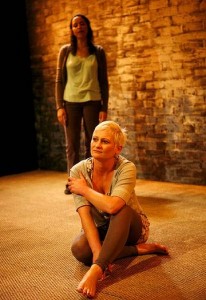Dirty Butterfly | Flour Sugar Tea, Arts Radar, B-Sharp
- August 3rd, 2010
- Posted in Reviews & Responses
- Write comment

Debbie Tucker Green’s Dirty Butterfly is no easy night in the theatre. But then again, not all theatre is written to be easy. At the heart of so many stories are cautionary tales- unimaginable feats of bravery (or stupidity)- often parables wherein instinct (lust, desire) overwhelms logic and duty to disasterous ends. Launguage – sharp. Direct. Poetic. A rhythm that hypnotises through repetition- like a needle stuck skipping over the same black grooves in the vinyl. It feels scratched. The language- the delivery. Is Scratched. Scratchy. Sentences are clipped- but not neatly. Like a pen franticly scratching it’s ink-blood on the back of an opened envelope. It sounds like. Like? It sounds like. The play sounds like rapid fire gunshots.
With inexorable regularity, Jason (Dorian Nkono) and Amelia (Sara Zwangobani), listen to the sounds of their neighbour Jo (Zoe Houghton), as she is routinely bashed. After a period of time, Amelia retreats into the downstairs- shutting herself away from the horror of hearing the abuse, while Jason is drawn fascinated into the regular occurrences. Listening is the new voyeurism- and Jason becomes obsessively immersed in the trauma and the desperation of Jo’s situation. Jason is seduced. Amelia disengaged. Jo is broken.
Wayne Blair has chosen a minimal approach to the staging of the piece and makes room for the text to be the star. In a simple design of sea-grass matting and a beautifully treated back wall courtesy of designer Teresa Negroponte, the actors are focussed on their task- to speak the words clearly and as pointedly. All language is loaded. All words are ready to be used- actors point their words at each other- language is artillery- and is used as such. The second half of the play is taken out of the drab domestic space and put into the clinical and public space, that of a cafe. Stainless steel chairs and a white gloss floor- the contrast is spectacular.
I stumbled into this article-
http://www.independent.co.uk/arts-entertainment/theatre-dance/features/debbie-tucker-green-if-you-hate-the-show-at-least-you-have-passion-596009.html
which I think is really useful in that “if you hate the show at least you have passion.” Some may hate the show… they may not like the subject matter, the gore, the style, the design… The strange thing for me is that I felt a curious disconnect with the people in the play- perhaps the dialogue too sharp- perhaps it lacked human warmth? Why am I expecting warmth from this play? What is it in me that I want to empathise? I felt like an aural voyeur- like that of Jason. I was listening- but because I was shown visually (it is theatre after all- and theatre comes from the Greek word “to see”) who was on the other side of the wall- what the bashing looks like- the horror is removed- I don’t connect with it. It becomes a theatrical trick. I was listening to the actors deliver their performances- clearly- sharply. It felt highly formalised- the signs of emotion displayed- and yet nothing stirred in me. I found at times the performances to be as contained and tailored as the language. Alien almost.
What has effected me is the thought about the desensitisation to violence. My acceptance of the situation echoed that of Amelia’s reaction to Jo – and that frightened me. I found it nearly impossible to connect with the characters- as they seemed all consumed in their own world- unaware of the audience.
Debbie Tucker Green’s plays are not easy. For those who saw Lee Lewis’ production of Stoning Mary- you may be aware of the ethical/personal struggles she poses to her audience. Wayne Blair’s production is crisp- perhaps too crisp? I found myself watching but not engaged, which I believe is due to the style of writing overwhelming the story and the humans in the story. Even after sometime, I was not able to fully embrace the poetic jarring of the interchanges between the characters- and perhaps that is the point- that humans fail when language fails?
I hadn’t thought about that – I truly didn’t connect to the characters/performers – I felt they were in a different world to me – and felt that they were not important. On looking back at this – that’s a shocking thing! I wasn’t interested in watching – I couldn’t make myself care for the woman being beaten regularly, it all felt unreal “This could never happen to me”. I’ve always been attracted to theatre that draws on the quiet assumption at the back of the head that says “I’m safe, because none of this is real” – then transposes that to “I’m safe because this wouldn’t happen to me” and then hits one further note where the characters echo the words whispering in the back of our heads. It’s horrifying to realise that these characters are actually exactly the same as us.
I think this production just missed out on the last part – perhaps the clipped nature of the language – But I think it’s interesting to remember that the effect of this language is to simulate a feeling of disinterest – Can this be broken by a change? What would happen if this short, sharp overlapping dialogue turned into simple “natural” speech, if in the moment it changes we are finally brought to care about these characters, to empathise, to hope for – only to realise it is too late and the events which we blindly ignored have destroyed them utterly, and all that is left is the gut-wrenching knowledge that everything has irreversibly changed, or, as the poets say “We’re all fucked”